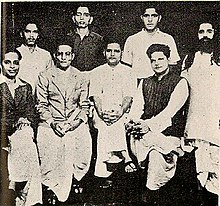Vinayak Damodar Savarkar
Vinayak Damodar Savarkar (called Vir [Veer] Savarkar ; Marathi : विनायक दामोदर सावरकर, Vināyak Dāmodar Sāvarakar; born May 28, 1883 in the village of Bhagur near Nashik ; † February 26, 1966 in Nagpur , Maharashtra ) was an Indian politician. He developed a Hindu nationalist political ideology which he called Hindutva .
Savarkar studied in India and England and represented revolutionary ideas of a violent struggle to achieve Indian independence. He published The Indian War of Independence , a pamphlet on the Indian uprising of 1857 that was banned by the British colonial rulers. In 1910, Savarkar was arrested for his association with the revolutionary group India House . He was sentenced to 50 years in prison and taken to a prison in the Andaman Islands .
In prison he described the Hindutva idea of open Hindu nationalism and wrote his writing Hindutva: Who is a Hindu? which later became a kind of basic writing of the Hindutva ideology. The font was smuggled out of prison, initially published under the pseudonym A. Mahratta and the title "Essentials Of Hindutva" in 1923 and only later received the above title. In the book, Savarkar answered the question of who a Hindu was as follows:
“[...] the first important essential qualification of a Hindu is that to him the land that extends from Sindhu to Sindhu is the Fatherland, (Pitribhu) the Motherland (Matribhu) the land of his patriarchs and forefathers. [...] The second most important essential of Hindutva is that a Hindu is a descendant of Hindu parents, claims to have the blood of the ancient Sindhu and the race that sprang from them in his veins. [...] The system or set of religions which we call Hindu Dharma is as truly the offspring of this soil as the men whose thoughts they are or who 'saw' the truth revealed in them. […] So to every Hindu, […] this Bharata bhumi this Sindhusthan is at once a Pitribhu and a Punyabhu - fatherland and a holy land. "
“The first important and indispensable requirement for a Hindu is that he regards India as the fatherland (Pitribhu) and the motherland (Matribhu), i.e. the land of his ancestors and forefathers. […] Second, it is essential for the Hindutva that a Hindu is a descendant of Hindu parents and can claim that the blood of the ancient Indians and the people that arose from them should flow in his veins. [...] The system and group of religions that we call Hindu Dharma are just as truly a product of this soil as are the men whose thoughts it arose or who "saw" the truth revealed before them. [...] Accordingly, for every Hindu this Bharata bhumi ("Mother India") this Sindhusthan is at the same time a Pitribhu and a Punyabhu - a fatherland and a holy land. "
From this mixture of a ethnic-religious definition it followed for Savarkar that members of non-Hindu religions should not be regarded as actual children of India, as Hindus in this sense, but only as "guests" as long as they adhered to the non-Hindu religions:
“That is why in the case of some of our Mohammedan or Christian countrymen who had originally been forcibly converted to a non-Hindu religion and who consequently have inherited along with Hindus, a common Fatherland and a greater part of the wealth of a common culture —Language, law, customs, folklore and history — are not and cannot be recognized as Hindus. For though Hindusthan to them is Fatherland as to any other Hindu yet it is not to them a Holyland too. Their holyland is far off in Arabia or Palestine. Their mythology and Godmen, ideas and heroes are not the children of this soil. "
“This is why in the case of some of our Muslim and Christian compatriots who were originally converted to a non-Hindu religion by force and then, together with the Hindus, a common fatherland and a large part of common culture, language, laws, customs, folklore and have shared history cannot be recognized as Hindus. Because for them Hindustan is the fatherland, as it is for every Hindu, but not at the same time the Holy Land. Their Holy Land is far away, in Arabia or Palestine. Your mythology and men of God, ideas and heroes are not children of this soil. "

In 1921 he was released on condition that he cease his revolutionary activities. However, Savarkar campaigned for a Hindu-dominated India, traveled and lectured. He became president of the newly founded Hindu Mahasabha and a vehement critic of the Indian National Congress and its acceptance of the division of India . Critics consider his appearance to be the cause of several attacks on Mohandas Karamchand Gandhi . He was arrested in connection with this but acquitted for lack of evidence. He spent the last years of his life writing about his idea of Hindutva .
The airport in Port Blair is named after him ( Vir Savarkar Airport ).
literature
- Siegfried O. Wolf: Vinayak Damodar Savarkar's "strategic agnosticism". A compilation of his socio-political philosophy and worldview . (= Heidelberg Papers in South Asian and Comparative Politics; Working Paper No. 51). University of Heidelberg, 2002 ( full text )
Web links
- Article about Vinayak Damodar Savarkar on the website of the Südasien-Informationsnetz eV (suedasien.info)
- Hindutva (Who Is A Hindu?) - the original document, on the Internet Archive
- Hindutva (Who Is A Hindu?) - digitized text without foreword and introduction
Individual evidence
- ↑ a b V.D. Savarkar: Essentials of Hindutva. (pdf) Retrieved August 30, 2015 (English, digitized text, 1921-22).
| personal data | |
|---|---|
| SURNAME | Savarkar, Vinayak Damodar |
| BRIEF DESCRIPTION | Indian politician |
| DATE OF BIRTH | May 28, 1883 |
| PLACE OF BIRTH | Bhagur at Nashik |
| DATE OF DEATH | February 26, 1966 |
| Place of death | Nagpur , Maharashtra |
